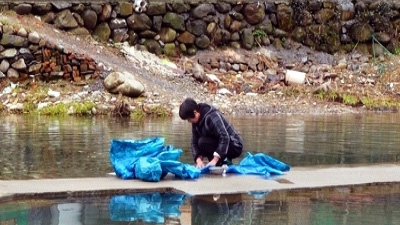Overview
- A comprehensive rural wastewater management program (WMP) is a multi-tiered approach including institutional, educational, technical, and financial commitments at all sectors of village, county, municipal, provincial and central governments.
- The institutional aspects of a program require the establishment of clear policies, regulations, and governance to facilitate the planning, implementation, operation, supervision and evaluation of projects.
- Continued education and training at the municipal, county, and village levels are important to building institutional and technical capacity.
- Appropriate sanitation technology should be selected that is low cost and can be easily and reliably operated and maintained by rural villages.
- Project financing will likely use different sources of funds, including public funds, non-governmental loans, public subsidies to assist low-income villagers, and cost sharing opportunities for both monetary and non-monetary expenses.
Issues of importance in considering wastewater management systems can be divided into technical issues, institutional issues and financial issues.
Technical Issues
- Decentralized versus Centralized Approaches. Any wastewater management program in rural China needs to consider the costs and benefits of decentralized and centralized solutions.
- Changes in Level of Water Supply. Increases in water supply create a corresponding need for to manage greater volumes of wastewater.
- Physical factors. The climate, geography, hydrogeology, soil type, and other environmental factors can affect the sanitation solutions that might be the most feasible and cost effective in a given location.
- Technological Factors. Complex technologies can be difficult as well as costly for villages to operate and maintain, or to obtain spare parts and consumable materials, such as filters or chemicals.
Financial Issues
- Organization and Finance. Investment and operation and maintenance costs must be kept low. Great care must be taken to ensure that generated income can match expenses throughout the lifetime of the system.
- Balancing Private Investment and Subsidies. Many poorer families have not been able to afford approved sanitation devices. More funding has become available, but directing this funding adequately remains a great challenge.
Institutional Issues
- Policies, Standards, Regulations and Guidelines. Policies, regulations and guidelines need to be clear. Particular importance needs to be given to clearly outline the responsibilities of different parties to minimize potential for conflict.
- Participatory Approach in Community Development. Recent wastewater management programs in China have included significant a participatory component. Thus, local communities get an important voice in their own development.
- Project Monitoring, Tracking and Evaluation. A project tracking system implemented by the municipal and county wastewater management offices should be an essential part of the WMP.
- Long-term Planning for Future Needs. A longer lifetime trajectory (30 to 50 years) is suggested to anticipate future changes.
- Training and Capacity Building. Sufficient funds need to be allocated to training to ensure establishment of the necessary skills. Institutional training and capacity building are also key to support villages and supply a skilled work force.
- Lessons Learned. Future projects need to take into account what lessons can be learned from past experience.

